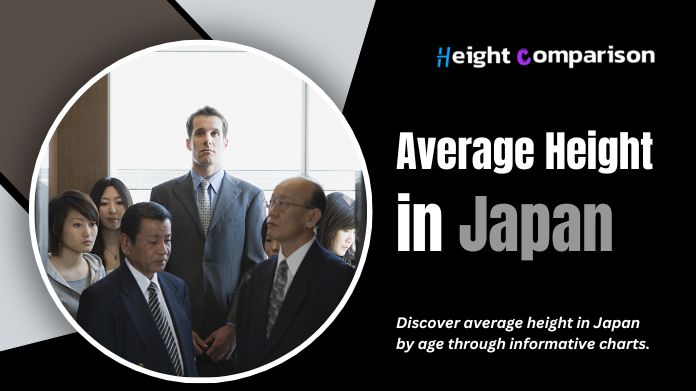Understanding the average height of individuals within a population, such as in Japan, provides valuable insights into various aspects of health, nutrition, genetics, and overall demographics. The average height in Japan varies across different age groups and genders, reflecting factors like lifestyle changes, dietary habits, healthcare advancements, and genetic influences.
In this guide, we will explore the average height in Japan and provide charts categorized by age groups to illustrate these trends comprehensively. By examining these data points, we can better understand how height distribution evolves over time in Japanese society.
Additionally, we will delve into the importance of average height data, including its implications for public health policies, nutritional guidelines, and healthcare strategies. Understanding height patterns by age can also shed light on socioeconomic factors, cultural influences, and potential areas for health interventions or improvements.
Let’s delve into the average height in Japan across different age brackets and explore the underlying factors contributing to these trends, highlighting the importance of height data in broader demographic and health-related discussions.
Are Japanese People Short?
It is not appropriate to generalize or label any group of people based on physical characteristics like height. While the average height of Japanese individuals may be slightly shorter compared to some populations, it is essential to recognize that height alone does not define a person’s abilities, intelligence, or worth.
Japanese individuals, like people from all backgrounds, contribute significantly to various fields and possess unique strengths and qualities beyond physical attributes.
Therefore, discussions about height or physical characteristics should be approached with respect, sensitivity, and an understanding of the diverse nature of human beings. Appreciating cultural diversity and celebrating individuals’ contributions and achievements regardless of their height is more meaningful.
Average Height in Japan and Charts by Age

Japan is known for having a relatively shorter population than many Western countries. However, over the past few decades, the average height of Japanese people has increased due to nutrition and health care improvements.
Here are the average heights for Japanese men and women and charts by age group.
Average Height in Japan:
- Men: 170.8 cm (5 feet 7.2 inches)
- Women: 158.8 cm (5 feet 2.5 inches)
Height Chart by Age for Japanese Men:
| Age (years) | Average Height (cm) | Average Height (inches) |
|---|---|---|
| 20-24 | 172.0 | 5 feet 7.7 inches |
| 25-29 | 172.2 | 5 feet 7.8 inches |
| 30-34 | 172.1 | 5 feet 7.8 inches |
| 35-39 | 171.7 | 5 feet 7.6 inches |
| 40-44 | 171.1 | 5 feet 7.3 inches |
| 45-49 | 170.3 | 5 feet 7.0 inches |
| 50-54 | 169.5 | 5 feet 6.7 inches |
| 55-59 | 168.6 | 5 feet 6.4 inches |
| 60-64 | 167.5 | 5 feet 6.0 inches |
| 65-69 | 166.2 | 5 feet 5.4 inches |
| 70-74 | 165.0 | 5 feet 5.0 inches |
| 75-79 | 163.7 | 5 feet 4.4 inches |
| 80+ | 162.0 | 5 feet 3.8 inches |
Height Chart by Age for Japanese Women:
| Age (years) | Average Height (cm) | Average Height (inches) |
|---|---|---|
| 20-24 | 158.9 | 5 feet 2.6 inches |
| 25-29 | 158.9 | 5 feet 2.6 inches |
| 30-34 | 158.8 | 5 feet 2.5 inches |
| 35-39 | 158.7 | 5 feet 2.5 inches |
| 40-44 | 158.4 | 5 feet 2.4 inches |
| 45-49 | 157.9 | 5 feet 2.2 inches |
| 50-54 | 156.9 | 5 feet 1.8 inches |
| 55-59 | 155.6 | 5 feet 1.2 inches |
| 60-64 | 154.1 | 5 feet 0.6 inches |
| 65-69 | 152.4 | 5 feet 0.0 inches |
| 70-74 | 150.7 | 4 feet 11.3 inches |
| 75-79 | 148.9 | 4 feet 10.6 inches |
| 80+ | 146.7 | 4 feet 9.8 inches |
It’s important to note that these figures are averages, and individual heights can vary significantly. Genetics, nutrition, and health can all contribute to a person’s height. Additionally, younger generations in Japan tend to be taller than older generations, reflecting improved living conditions and nutrition over time.
Japanese Average Height Compared to That of the Universe
Like any specific population, the average height of Japanese individuals varies based on genetic, environmental, and cultural factors. However, comparing the average height of Japanese people to that of the entire universe is not meaningful or scientifically relevant.
Height measurements are specific to human populations on Earth and are influenced by factors such as nutrition, healthcare, genetics, and living conditions. The concept of height does not apply beyond human populations on our planet, let alone the entire universe, which encompasses vast and diverse celestial bodies and phenomena.
Therefore, it’s important to focus discussions on average height within relevant human populations and avoid comparisons that are not scientifically valid or meaningful. Understanding and appreciating height differences among human populations should be done concerning each group’s unique characteristics and contributions rather than attempting comparisons on a universal scale.
Final Note
Like in any country, the average height in Japan is influenced by various factors such as genetics, nutrition, healthcare, and living standards. While Japanese individuals may have a slightly different average height compared to others, it’s crucial to avoid making generalizations or stereotypes based on physical characteristics.
Charts depicting average height by age in Japan provide valuable insights into trends and variations within the population. These data points can inform discussions on health, nutrition, and societal changes over time. However, it’s essential to interpret such data responsibly and avoid using height to measure a population’s well-being or capabilities.
Appreciating diversity and understanding the multifaceted factors contributing to physical attributes like height are key to promoting inclusivity and respect for all individuals. Height should not be a basis for judgment or comparison but a part of the rich tapestry of human diversity we should celebrate and embrace.






